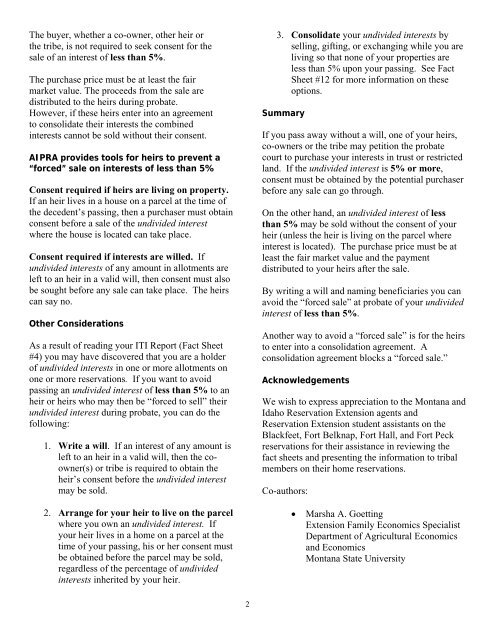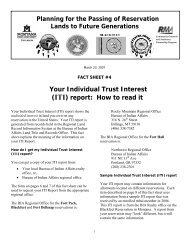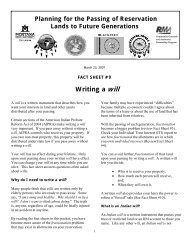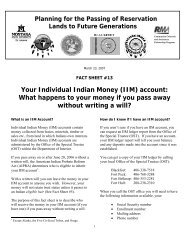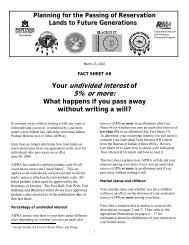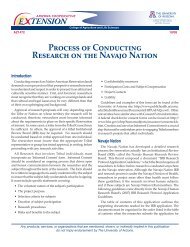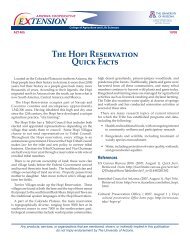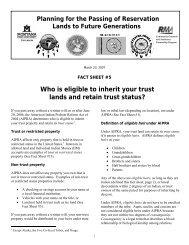AIPRA Factsheet 10 - Indian Country Extension
AIPRA Factsheet 10 - Indian Country Extension
AIPRA Factsheet 10 - Indian Country Extension
- No tags were found...
You also want an ePaper? Increase the reach of your titles
YUMPU automatically turns print PDFs into web optimized ePapers that Google loves.
The buyer, whether a co-owner, other heir or<br />
the tribe, is not required to seek consent for the<br />
sale of an interest of less than 5%.<br />
The purchase price must be at least the fair<br />
market value. The proceeds from the sale are<br />
distributed to the heirs during probate.<br />
However, if these heirs enter into an agreement<br />
to consolidate their interests the combined<br />
interests cannot be sold without their consent.<br />
<strong>AIPRA</strong> provides tools for heirs to prevent a<br />
“forced” sale on interests of less than 5%<br />
Consent required if heirs are living on property.<br />
If an heir lives in a house on a parcel at the time of<br />
the decedent’s passing, then a purchaser must obtain<br />
consent before a sale of the undivided interest<br />
where the house is located can take place.<br />
Consent required if interests are willed. If<br />
undivided interests of any amount in allotments are<br />
left to an heir in a valid will, then consent must also<br />
be sought before any sale can take place. The heirs<br />
can say no.<br />
Other Considerations<br />
As a result of reading your ITI Report (Fact Sheet<br />
#4) you may have discovered that you are a holder<br />
of undivided interests in one or more allotments on<br />
one or more reservations. If you want to avoid<br />
passing an undivided interest of less than 5% to an<br />
heir or heirs who may then be “forced to sell” their<br />
undivided interest during probate, you can do the<br />
following:<br />
1. Write a will. If an interest of any amount is<br />
left to an heir in a valid will, then the coowner(s)<br />
or tribe is required to obtain the<br />
heir’s consent before the undivided interest<br />
may be sold.<br />
2. Arrange for your heir to live on the parcel<br />
where you own an undivided interest. If<br />
your heir lives in a home on a parcel at the<br />
time of your passing, his or her consent must<br />
be obtained before the parcel may be sold,<br />
regardless of the percentage of undivided<br />
interests inherited by your heir.<br />
3. Consolidate your undivided interests by<br />
selling, gifting, or exchanging while you are<br />
living so that none of your properties are<br />
less than 5% upon your passing. See Fact<br />
Sheet #12 for more information on these<br />
options.<br />
Summary<br />
If you pass away without a will, one of your heirs,<br />
co-owners or the tribe may petition the probate<br />
court to purchase your interests in trust or restricted<br />
land. If the undivided interest is 5% or more,<br />
consent must be obtained by the potential purchaser<br />
before any sale can go through.<br />
On the other hand, an undivided interest of less<br />
than 5% may be sold without the consent of your<br />
heir (unless the heir is living on the parcel where<br />
interest is located). The purchase price must be at<br />
least the fair market value and the payment<br />
distributed to your heirs after the sale.<br />
By writing a will and naming beneficiaries you can<br />
avoid the “forced sale” at probate of your undivided<br />
interest of less than 5%.<br />
Another way to avoid a “forced sale” is for the heirs<br />
to enter into a consolidation agreement. A<br />
consolidation agreement blocks a “forced sale.”<br />
Acknowledgements<br />
We wish to express appreciation to the Montana and<br />
Idaho Reservation <strong>Extension</strong> agents and<br />
Reservation <strong>Extension</strong> student assistants on the<br />
Blackfeet, Fort Belknap, Fort Hall, and Fort Peck<br />
reservations for their assistance in reviewing the<br />
fact sheets and presenting the information to tribal<br />
members on their home reservations.<br />
Co-authors:<br />
• Marsha A. Goetting<br />
<strong>Extension</strong> Family Economics Specialist<br />
Department of Agricultural Economics<br />
and Economics<br />
Montana State University<br />
2


